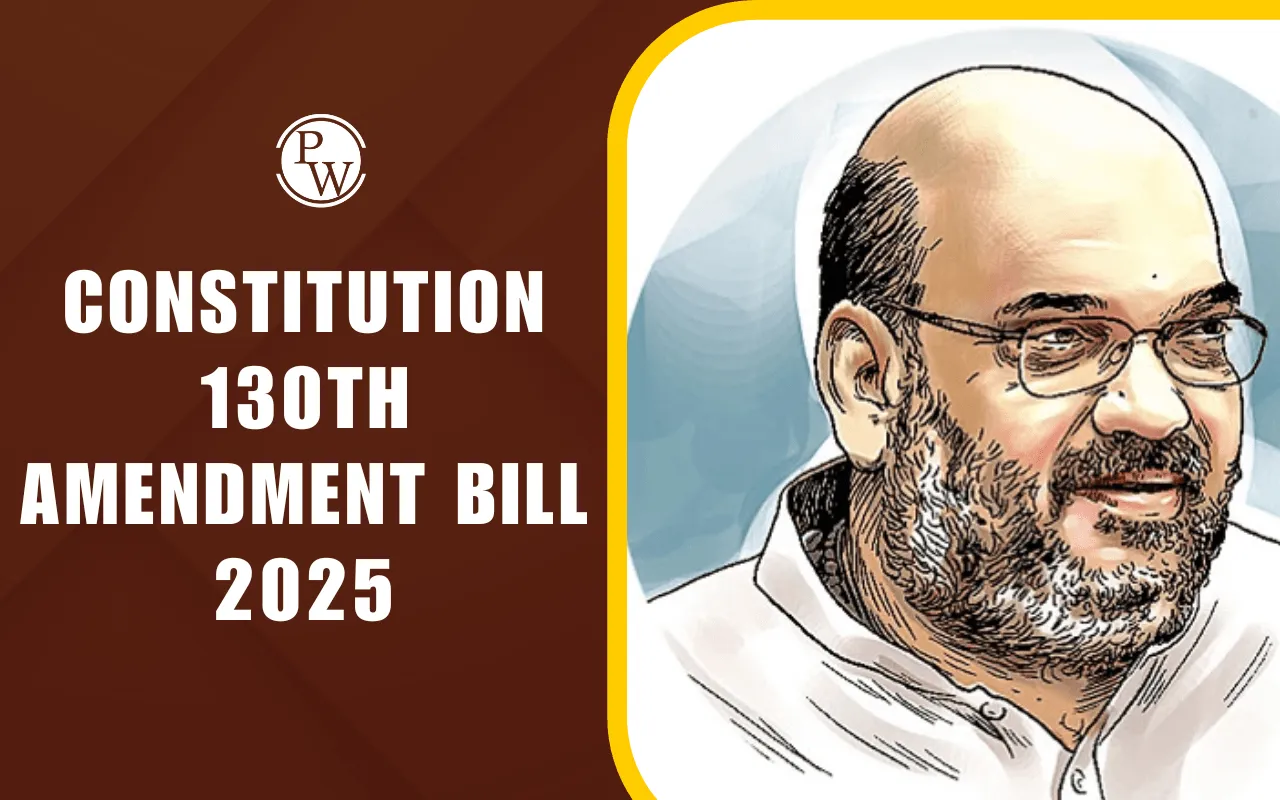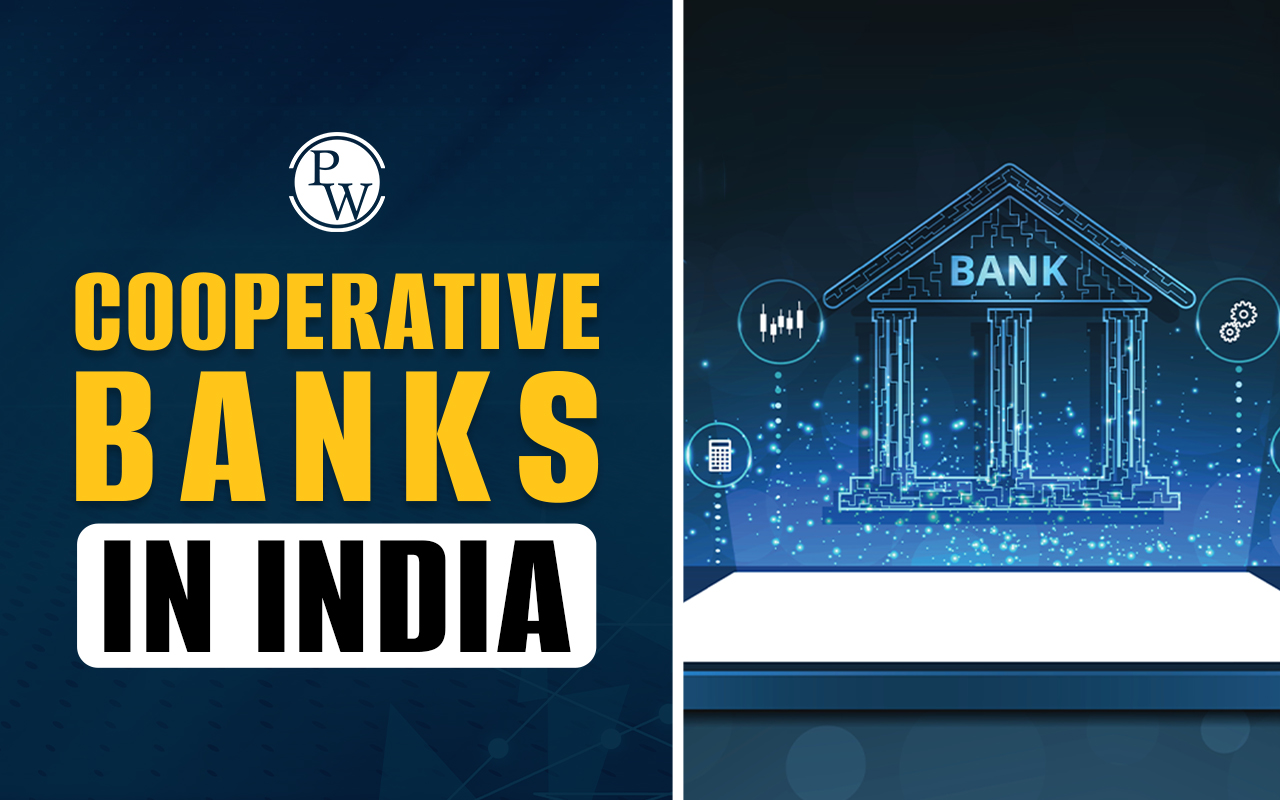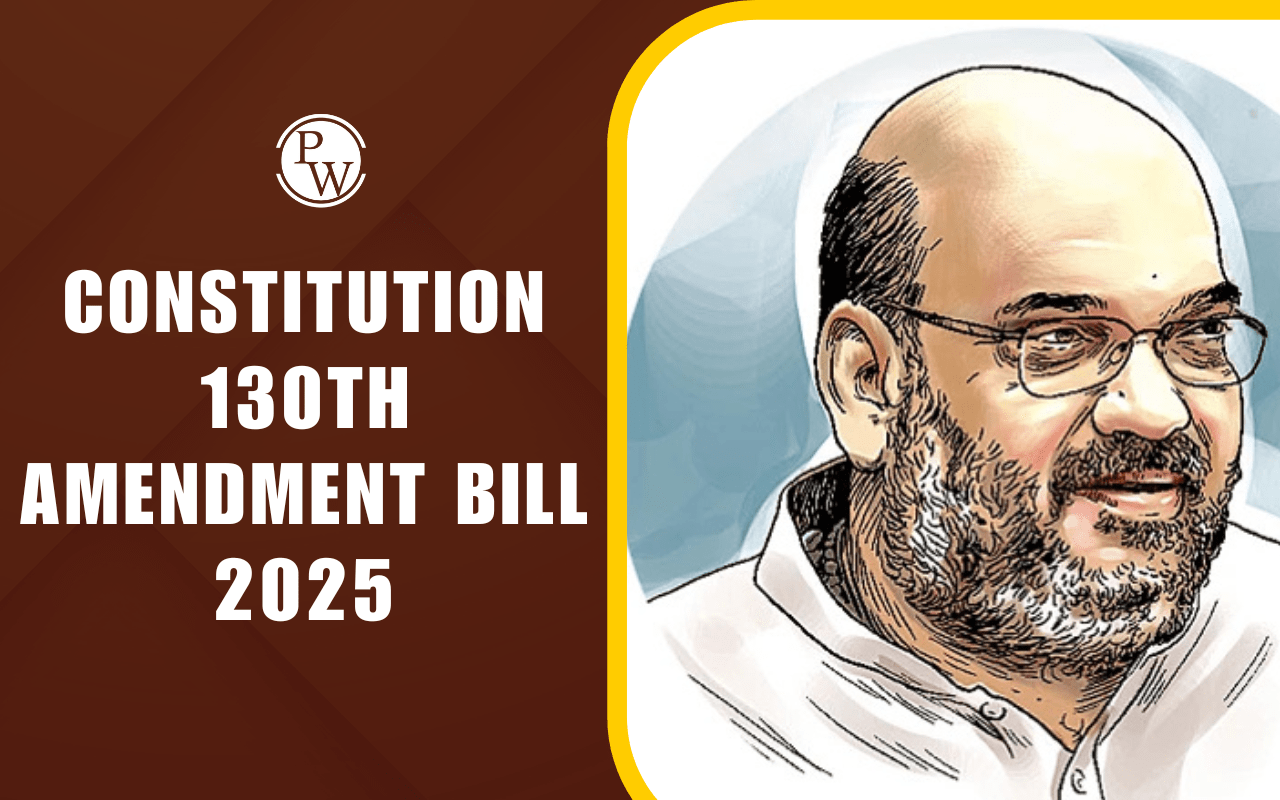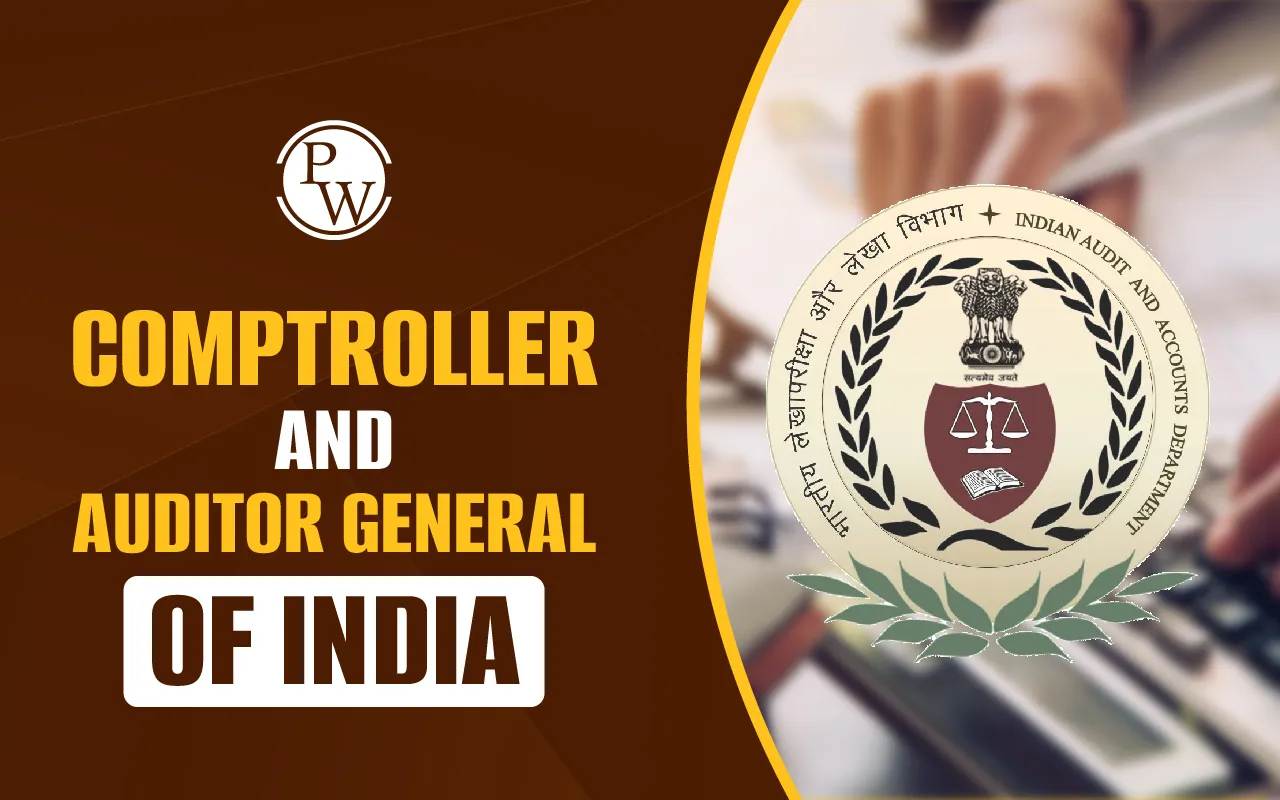
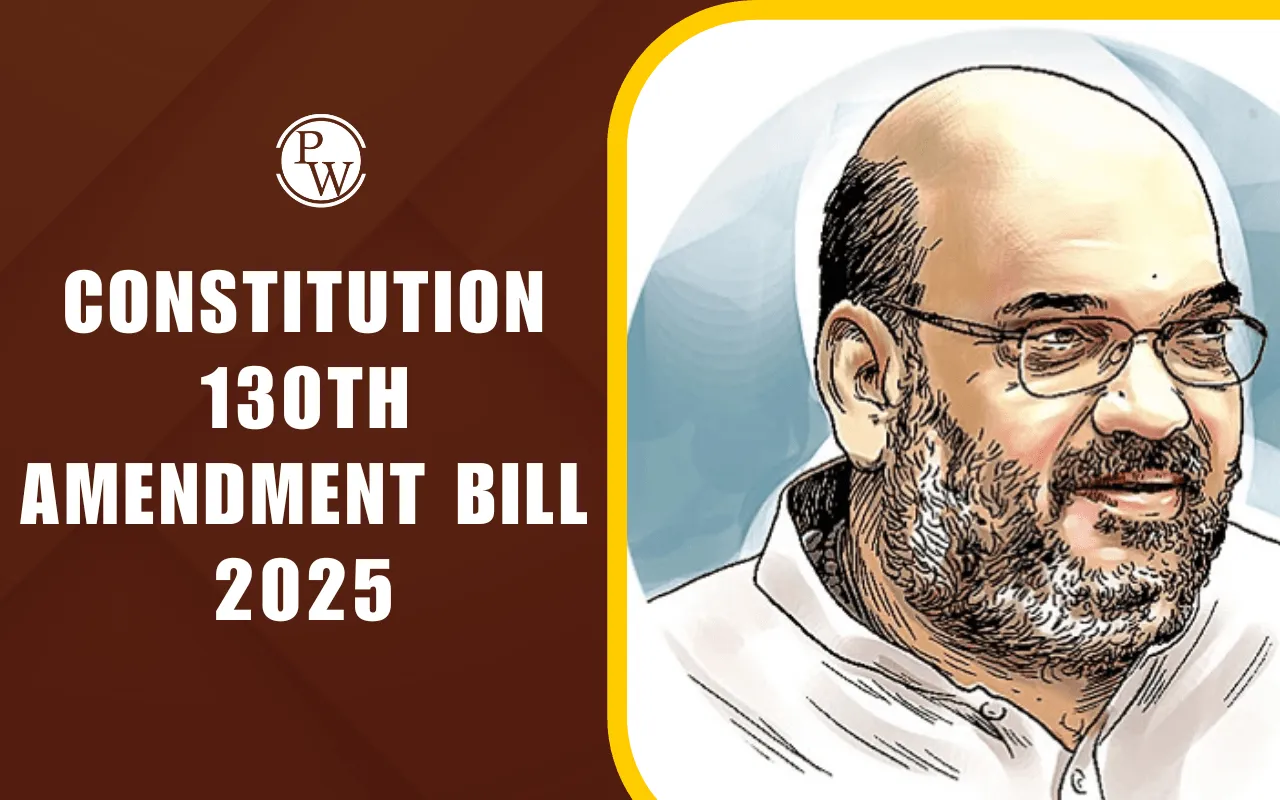
Constitution 130th Amendment Bill is a proposed change to the Indian Constitution aimed at strengthening governance and improving the functioning of key institutions.
It introduces specific revisions to existing constitutional provisions to ensure better representation, efficiency, and accountability in the system. The bill reflects the government’s effort to update constitutional frameworks in line with current needs and evolving democratic practices.
Constitution 130th Amendment Bill
The ongoing debate surrounding the Constitution (One Hundred and Thirtieth Amendment) Bill marks a pivotal moment in India's legislative efforts to combat the criminalization of politics and uphold ethical governance.
Introduced in Parliament, this significant Bill proposes a new mechanism for the removal of Ministers who face prolonged judicial custody for serious criminal offences. It seeks to close a critical gap in the existing legal framework, ensuring that individuals holding the highest executive offices maintain a character "beyond any ray of suspicion".
Background and Rationale for the 130th Amendment Bill
The 130th Amendment Bill emerged from recent high-profile cases where incumbent Chief Ministers and Ministers continued to remain in office despite being arrested and detained on serious criminal charges.
Incidents such as the controversies involving former Ministers in Tamil Nadu and the Chief Minister of Delhi exposed a constitutional gap, raising concerns about accountability and the ethical functioning of public offices.
The Bill's primary rationale, articulated in its Statement of Objects and Reasons, is two-fold:
-
Upholding Constitutional Morality: A Minister who is arrested and detained for a serious criminal offence "may thwart or hinder the canons of constitutional morality and principles of good governance".
-
Protecting Public Trust: The continuance of such individuals in office diminishes the constitutional trust reposed by the people in their representatives.
Provisions of the Constitution 130th Amendment Bill, 2025
The core of the Constitution 130th Amendment Bill is the introduction of an explicit mechanism for the temporary removal of Ministers at the Central and State levels, including the Prime Minister and Chief Ministers, based on the duration of their detention.
Grounds for Automatic Removal
A Union Minister, Chief Minister (CM), or State Minister will be removed from office if they meet two specific criteria:
-
They are accused of an offence punishable with imprisonment for a term which may extend to five years or more.
-
They have been arrested and detained in custody for 30 consecutive days.
The Procedure for Union and State Ministers
For a Minister (excluding the Prime Minister or Chief Minister) who is detained for 30 consecutive days:
-
Union Minister: The President must remove the Minister on the advice of the Prime Minister. If the Prime Minister does not tender this advice by the 31st day, the Minister will automatically cease to hold office from the day thereafter.
-
State Minister: The Governor must remove the Minister on the advice of the Chief Minister. If the Chief Minister does not tender this advice by the 31st day, the Minister will automatically cease to hold office.
-
National Capital Territory (NCT) of Delhi: Similar provisions apply, with the President acting on the advice of the Delhi Chief Minister.
Mandatory Resignation for Prime Minister and Chief Minister
The Constitution (130th Amendment) Bill places a direct obligation on the head of the executive:
-
The Prime Minister or a Chief Minister (of a State or Delhi) must tender their resignation by the 31st consecutive day of custody.
-
If they fail to resign by this time, they will automatically cease to hold office from the following day.
Provision for Reappointment: Importantly, the Bill explicitly states that a Minister, Prime Minister, or Chief Minister who is removed from office under these provisions is not barred from being reappointed once they are released from custody.
Constitutional Articles Slated for Amendment
The Constitution 130th Amendment Bill proposes significant changes to key Articles that define the structure and appointment of the Council of Ministers in the country:
-
Article 75: Deals with the appointment, tenure, and responsibilities of the Prime Minister and the Union Council of Ministers.
-
Article 164: Relates to the appointment and provisions for the Chief Minister and the Council of Ministers in the States.
-
Article 239AA: Contains the special provisions related to the administration of the National Capital Territory of Delhi, extending the removal rule to its Chief Minister and Ministers.
The provisions are also intended to be extended to other Union Territories like Puducherry and Jammu and Kashmir through two related Bills: the Government of Union Territories (Amendment) Bill, 2025, and the Jammu and Kashmir Reorganization (Amendment) Bill, 2025.
Arguments in Favour of the Bill
Proponents of the Constitution (One Hundred and Thirtieth Amendment) Bill, 2025 argue that it is a necessary step towards deepening democracy and accountability:
-
Bridging the Legal Gap: The current law, primarily the Representation of the People Act, 1951 (RPA), only disqualifies a legislator upon conviction and sentencing of two or more years. This Bill addresses the period of pre-conviction custody, which was previously unaddressed, thereby bridging a crucial legal gap.
-
Alignment with Public Servant Rules: It is argued that if an ordinary government employee is subject to suspension after a short period of custody (e.g., 48 hours), a higher standard of morality and accountability must be expected of elected public servants like Ministers.
-
Curbing "Governance from Jail": The Bill prevents the anomaly of a Minister or Chief Minister attempting to govern the state from within prison, which impairs the functionality of the executive and lowers its constitutional authority.
Concerns and Criticisms: Undermining Democratic Principles
The Constitution 130th Amendment Bill has faced sharp criticism from the Opposition and legal experts, who have raised serious concerns about its implications for India's democratic and federal structure:
-
Against the Presumption of Innocence: The most significant criticism is that the Bill contradicts the basic principle of "innocent until proven guilty". It mandates removal based on detention alone, not a court-determined conviction.
-
Risk of Political Weaponization: Critics argue that the provision could be weaponized by the Union government through central investigative agencies like the CBI and ED. A ruling party at the Centre could potentially use targeted arrests under serious charges to destabilize and remove Chief Ministers or Ministers of opposition-ruled State governments, thereby threatening the principle of Federalism.
-
Executive Discretion and Political Misuse: The dual mechanism of removal, either by the Prime Minister's/Chief Minister's advice or automatic cessation, could lead to politicization. This may allow a head of the executive to remove political rivals while protecting their allies facing similar charges.
-
"Revolving Door" Problem: Allowing a Minister to be immediately reappointed upon release from custody could lead to political instability and encourage tactical legal maneuvers, creating a cyclical problem of removal and reinstatement.
Constitution 130th Amendment Bill FAQs
What is the primary purpose of the 130th Amendment Bill?
Which Articles of the Constitution of India does the 130th Amendment Bill seek to amend?
Is the removal of a Minister under the 130th Amendment Bill based on conviction or detention?
Can a Minister who is removed under the Constitution 130th Amendment Bill be reappointed to office?

UPSC Coaching
